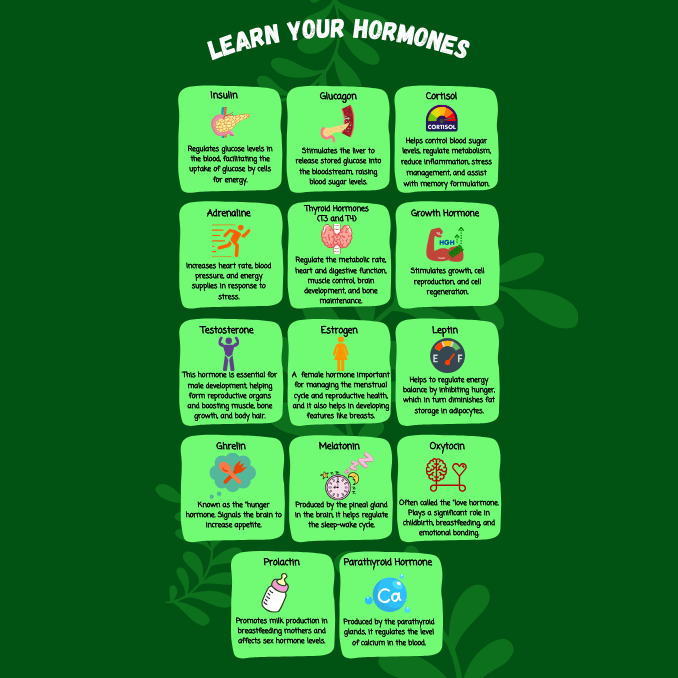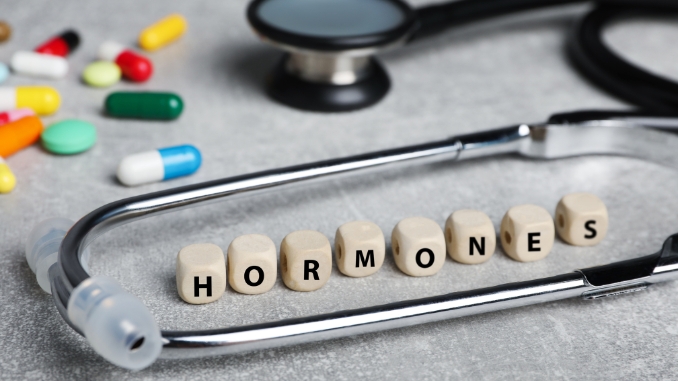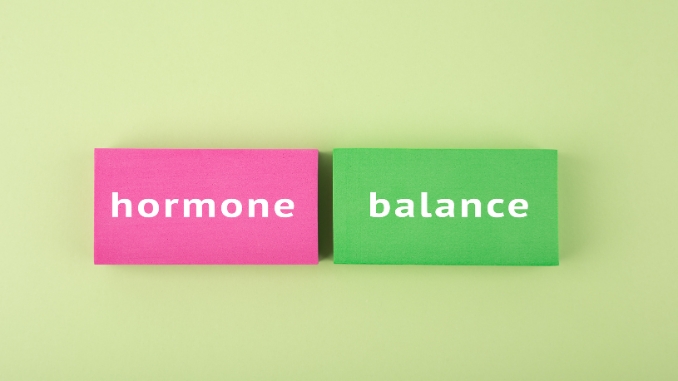Understanding and managing hormonal fluctuations can be a complex and nuanced process. The intricate dance of hormones within our body underscores the delicate balance required for optimal health.
However, achieving and maintaining hormonal balance is often easier said than done due to the myriad factors that can lead to hormonal imbalances. The symptoms of hormonal imbalance can be as varied as the causes, manifesting in physical, emotional, and reproductive health issues.
In this article, we'll tackle a comprehensive approach to how to balance hormones and mitigate the challenges posed by hormonal imbalances, ensuring a path toward improved health and well-being.
What are Hormones?

Hormones are chemical messengers produced by the endocrine system in the body, such as the pituitary gland, thyroid, adrenal glands, and pancreas. They travel through the bloodstream to various organs and tissues, signaling them to perform functions crucial for maintaining homeostasis.
Homeostasis is the process by which the body maintains a stable internal environment despite changes in external conditions. This biological balance is also essential for the proper functioning of the body and includes the regulation of factors like temperature, pH levels, and the concentration of nutrients and waste products.
In addition, hormones regulate a wide range of physiological processes, including growth and development, metabolism, sexual function, reproduction, and mood. The balance of these hormones is essential for overall health; even small imbalances can significantly impact how the body functions.
Understanding hormones and their effects helps in managing health and diagnosing hormonal imbalances accurately. To understand further, let's look into different hormones that are integral to the body's ability to function and maintain a healthy state:
Understanding Hormonal Imbalance: Factors and Symptoms

Hormones are vital chemical messengers that impact the body's systems, regulating processes from growth and metabolism to mood and reproduction. Hormonal imbalance occurs when there is too much or too little of one or more hormones in the bloodstream. Minor hormonal imbalances can significantly alter body function, causing various health issues in both genders.
In males, these imbalances can delay puberty, lead to the development of breast tissue (gynecomastia), reduce bone mass, and affect fertility. While for females, hormonal irregularities can disrupt menstrual cycles, contribute to conditions like Polycystic Ovary Syndrome (PCOS)[¹] trigger early menopause, and affect breast development. Both genders may experience growth disorders, changes in weight, mood disorders, and skin conditions due to hormonal fluctuations.
These conditions highlight the importance of hormones in physical development and overall health, necessitating medical attention for significant imbalances.
Understanding these imbalances is crucial for diagnosing and also treating related conditions, ensuring the body maintains a harmonious balance for optimal health.
Factors That Affect Hormone
1. Lifestyle Factors

Hormonal imbalances can result from various factors encountered in daily life. Poor nutrition, characterized by diets high in processed foods and also sugars, can disrupt insulin levels and lead to insulin resistance, a common precursor to hormonal dysregulation.
Insulin is vital for maintaining stable blood sugar levels, and its proper functioning helps prevent conditions like diabetes, where the body's ability to manage glucose is impaired.
Sedentary lifestyles also contribute to hormonal imbalances by affecting metabolism and stress response. Regular exercise is vital for regulating insulin levels, promoting better sleep, and reducing stress.
Chronic stress triggers the release of cortisol, a hormone produced by the adrenal glands that plays a critical role in the body's stress response. It helps regulate metabolism, inflammation, and immune responses and maintains fluid balance and blood pressure.
However, persistent elevation of cortisol, known as the stress hormone, can disrupt the balance of other hormones such as insulin, estrogen, and testosterone, potentially leading to conditions like adrenal fatigue.
2. Environmental Factors
Environmental toxins and chemicals present in everyday products further complicate hormonal balance. Endocrine-disrupting chemicals (EDCs) found in plastics, pesticides, and household cleaners interfere with hormonal signaling in the body.
Some EDCs mimic estrogen, disrupting normal endocrine function and potentially causing reproductive issues and thyroid disorders.
3. Biological Factors
Underlying health conditions such as hypothyroidism, diabetes, and polycystic ovary syndrome (PCOS) directly impact hormone production and regulation. For example, hypothyroidism results in lower thyroid hormone levels, leading to symptoms like weight gain and menstrual irregularities due to disrupted hormonal signaling.
Life stage transitions also bring about significant hormonal fluctuations. Puberty marks the onset of hormonal changes as the body matures, leading to physical and emotional transformations.
Pregnancy involves substantial shifts in hormone levels to support fetal development, while menopause signifies the end of reproductive years and brings changes in estrogen and progesterone levels, often accompanied by symptoms like hot flashes and mood swings.
Understanding how these factors influence empowers individuals to take proactive steps in maintaining hormonal balance through lifestyle adjustments, environmental awareness, and proper management of underlying health conditions.
Symptoms
Symptoms of hormonal imbalances can manifest across physical, emotional, and reproductive spectrums.
- Physically, individuals may experience unexplained weight gain or loss, fatigue, and muscle weakness.
- Emotionally, fluctuating hormone levels can also trigger mood swings, anxiety, and depression.
- In terms of reproductive health, symptoms can include irregular menstrual cycles, reduced libido, and fertility issues.
- Other signs might involve skin changes, hair loss, and also temperature sensitivity
How to Naturally Balance Hormones

Balancing hormones naturally involves a combination of lifestyle changes, dietary adjustments, and stress management techniques. Here are some of the safest and most adaptable methods to achieve and maintain hormonal balance:
1. Nourish with Whole Foods
Prioritize fruits, vegetables, lean proteins, healthy fats, and whole grains to ensure a diverse range of essential nutrients crucial to maintaining hormonal balance.
Incorporate fatty fish like salmon and tuna, rich in omega-3s and healthy fats, which studies suggest improve insulin sensitivity and reduce inflammation[²].
Aim for a healthy diet with fiber-rich options like beans, lentils, and whole grains proven to aid in regulating sex hormones and blood sugar.
Reduce processed foods, sugars, and unhealthy fats linked to insulin resistance and inflammation, disrupting hormone imbalance.
2. Move Your Body, Boost Your Mood

Engage in regular physical activity (aerobic and strength training) to manage weight, reduce stress, and improve insulin sensitivity, all helpful to balance your hormones.
Moreover, embrace stress-management practices like meditation, yoga, deep breathing, and mindfulness, proven to effectively reduce cortisol, the stress hormone, benefiting hormonal balance.
3. Maintain Sleep-Wake Cycle
The consistent sleep-wake cycle, also known as the Circadian Rhythm[³], is integral to hormonal balance. Aligning your routine with natural light-dark cycles helps regulate hormones like melatonin, cortisol, and growth hormone.
Establish a regular sleep schedule, aiming for consistent bed and wake times, even on weekends, to support your body's internal clock. Minimize exposure to artificial light, especially blue light from screens, before bedtime, as it can disrupt melatonin production and impair sleep quality.
Additionally, prioritize exposure to natural sunlight during the day, as it helps regulate circadian rhythms and promote healthy hormone production. By prioritizing a balanced circadian rhythm, you support overall hormonal health and improve sleep quality, which in turn positively impacts hormone regulation and overall well-being.
4. Minimize Toxins, Maximize Health

According to the Endocrine Society[⁴], there are approximately 85,000 human-made chemicals worldwide, with over 1,000 potentially acting as endocrine disruptors due to their unique properties.
Some of the most common include:
- Atrazine: Commonly used herbicide for weed control in crops like corn, sorghum, and sugarcane.
- Bisphenol A (BPA): Found in polycarbonate plastics and epoxy resins used in manufacturing, food packaging, and toys.
- Dioxins: Byproduct of certain manufacturing processes, released into the air from waste burning and wildfires.
- Perchlorate: Industrial chemicals used in rockets, explosives, and fireworks, sometimes found in groundwater.
- Per- and polyfluoroalkyl substances (PFAS): Widely used in industrial applications like firefighting foam, nonstick pans, and textile coatings.
- Phthalates: Compounds used as liquid plasticizers found in food packaging, cosmetics, fragrances, and children's toys.
- Phytoestrogens: Naturally occurring hormone-like substances found in plants, including soy foods.
- Polybrominated diphenyl ethers (PBDE): Used as flame retardants in products like furniture, foam, and carpet.
- Polychlorinated biphenyls (PCBs): Formerly used in electrical equipment and other industrial applications until banned in 1979.
- Triclosan: Previously added to antimicrobial and personal care products like liquid body wash and soaps.
Scientists have determined that even very small amounts of these hormone-like chemicals can harm the organs and bodily functions of test animals.
Additionally, the Endocrine Society and the European Society of Endocrinology have emphasized the "widespread scientific evidence" indicating the harmful effects of endocrine-disrupting chemicals (EDCs)[⁵] on human, animal, and ecological health.
Therefore, efforts to minimize exposure, identify new EDCs, and understand underlying mechanisms are crucial for developing interventions to mitigate their adverse impacts.
5. Supplement Wisely, Consult Always
Consider discussing the potential benefits of supplements like Vitamin D, magnesium, and omega-3s with your healthcare professional, as individual needs and also potential interactions require personalized guidance.
6. Maintain a Healthy Weight
Hormones serve as chemical messengers governing various bodily processes, including those implicated in obesity. Leptin and insulin, alongside sex hormones and growth hormones, exert influence over our appetite, metabolism (the pace at which the body utilizes kilojoules for energy), and the distribution of body fat.
In individuals grappling with obesity, these hormones often manifest at levels that disrupt normal metabolism and promote the excessive accumulation of body fat[⁶].
Reaching and maintaining a healthy weight, especially managing abdominal fat, is crucial for preventing hormone imbalances associated with excess weight.
7. Gut Health - Your Hormone Ally
Include probiotic-rich foods like yogurt, kefir, and also fermented vegetables to improve gut health, potentially influencing hormone production and metabolism.
8. Hydration is Key
Water also plays a vital role in various bodily functions, indirectly affecting hormone function. Drink plenty of water throughout the day to help balance hormones.
9. Herbal Remedies - Proceed with Caution
While some herbs like ashwagandha, maca root, and black cohosh may offer potential benefits, research is ongoing. Consult your healthcare professional for individualization and safety considerations due to varying effectiveness and potential concerns.
Risk in Neglecting Hormonal Imbalance

Ignoring hormonal imbalances can lead to various health problems, from minor issues to severe, long-term effects. Below are some key risks associated with hormonal imbalances:
Reproductive Health Risks
Women may experience irregular menstrual cycles, fertility challenges, a higher miscarriage risk, endometriosis, polycystic ovary syndrome (PCOS), and changes in cervical cells.
Men could face reduced sperm count, erectile dysfunction, lower sex drive, and gynecomastia (development of breast tissue).
Metabolic Health Concerns
Accumulating fat, particularly around the abdomen, can both result from and exacerbate hormonal imbalances.
Insulin Resistance can progress to type 2 diabetes and associated complications. Imbalanced cholesterol and triglyceride levels increase the risk of cardiovascular disease such as Dyslipidemia.
Mental Health Issues
Hormonal imbalances can dramatically affect emotional health, triggering mood swings, anxiety, and also depression.
Hormone imbalance poses cognitive challenges, including trouble focusing, memory issues, and -decreased mental performance. Persistent tiredness without an obvious cause.
Bone Health
Hormone imbalance is a potent cause of Osteoporosis, a condition where bones become brittle and more prone to fractures, often linked to hormonal changes such as those during menopause.
Other Possible Risks
Hormonal imbalances may contribute to the development of certain cancers, like those of the breast and prostate.
Acne, hair loss, and also other skin issues may arise from hormonal imbalances and difficulty in falling or staying asleep.
These risks highlight the wide range of complications that can result from hormonal imbalances, underscoring the critical need for timely intervention and management.
Moreover, ignoring such imbalances can lead to deteriorating health and the development of chronic conditions, making it essential to seek medical advice and adopt lifestyle changes that support hormonal health.
Conclusion
Managing hormones and adopting proactive approaches to balance them are crucial steps toward a healthier future and the opportunity to enjoy life with loved ones. Hormonal imbalances can affect physical, mental, and also emotional well-being, leading to conditions like obesity, diabetes, depression, and reduced quality of life.
By focusing on a balanced diet, regular exercise, stress reduction, and adequate sleep, individuals can significantly improve their hormonal health. Addressing hormonal imbalances not only enhances personal health and happiness but also positively impacts relationships, allowing for more joyful and fulfilling interactions with loved ones. Taking control of hormonal health is a vital investment in one's future happiness and well-being.
Discover how to balance your hormones naturally and quickly. Check out this 14-Day Hormone Balancing Quick Start Program now!
Frequently Asked Questions
Does balancing hormones help in losing weight?
Yes, balancing hormones can significantly help in losing weight. Balancing hormones is key to weight loss, as they regulate metabolism, appetite, and fat storage.
Imbalances in insulin can lead to excess fat storage, especially around the abdomen, while elevated cortisol levels can increase fat storage and appetite. An underactive thyroid slows metabolism, contributing to weight gain.
Furthermore, leptin and ghrelin imbalances affect appetite control, potentially leading to overeating. Addressing these hormonal imbalances through a healthy diet, regular exercise, stress reduction, and adequate sleep can significantly enhance weight loss efforts.
In some cases, medical treatments may also be necessary. By focusing on hormonal balance, individuals can more effectively manage their weight and improve overall health.
What is Hormone Replacement Therapy?
Hormone replacement therapy (HRT) is a treatment that replaces or increases hormones your body needs but isn't making enough of, often due to menopause, hypogonadism, or thyroid disorders.
HRT can significantly alleviate symptoms associated with hormonal imbalances, such as hot flashes, night sweats, mood swings, and decreased libido.
It can also help in preventing osteoporosis and improving overall quality of life.
However, as with any other treatment, HRT also poses potential risks.; it may increase the likelihood of certain health issues, including blood clots, stroke, and some types of cancer.
Therefore, it's crucial for individuals to discuss and evaluate the benefits and risks of HRT with their healthcare provider to make an informed decision tailored to their specific health profile and individual needs.








